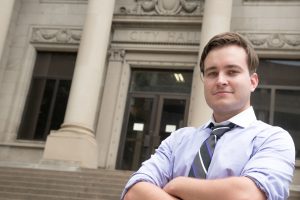
Derek Dahlk, this summer’s city of Eau Claire community planning department intern, stands in front of Eau Claire City Hall.
UW-Eau Claire environmental studies students are working toward a greener Eau Claire community while simultaneously getting a valuable internship opportunity.
For the last three years, Ned Noel, associate planner for the city of Eau Claire, has hired environmental studies students through a connection to UW-Eau Claire’s Watershed Institute for Collaborative Environmental Studies.
Past interns include Michaela Leach, Nathan Schaffer, Helué Vázquez, Bryan Voeltner and Vladimir Suntsov, each of the students coming from different academic disciplines ranging from geography to economics.
The students are able to get internship credit through the university, fulfill his or her service-learning, or opt for a paid internship through the Great Lakes Higher Education grant, awarded to UW-Eau Claire in fall 2015.
The students’ projects vary, Noel said, but generally the students work on anything related to sustainability, as well as other city planning work.
“It’s very dependent on the current projects, so some of the interns have helped me with the carbon footprint in the past. That’s generally the biggest project,” Noel said. “The university also does a similar project, and if we can find a student who has worked on the project at the university, then they have the experience to apply to the city.”
This summer’s intern Derek Dahlk, a liberal studies major studying critical theory and public policy, works on projects dealing with solar policy, public art, water conservation and nutrition planning. He also works in coalition with the city’s Advisory Commission on Sustainability, creating policy briefs, as well as brochures about solar policy and water conservation in order to develop “discourses about efficient design and building a more resilient Eau Claire,” Dahlk said.
Dahlk is also able to participate in community meetings for the Health Impact Assessment for the city’s Cannery District redevelopment.
The internship allows him a real look into how the inside of a city government operates, rather than simply learning about the theory of the process in a classroom setting, Dahlk said.
“Working with the city allows me to see into the institutional functions besides just writing about them in an abstract manner. It allows me to see the process that public decisions go through and the people who are fighting to improve the lived experience of Eau Claire residents,” Dahlk said. “My position allows me to see how ordinances are fabricated and be aware of the different levels of organizations active in varying sectors of Eau Claire life.”
Vladimir Suntsov, the first city of Eau Claire sustainability intern and a chemistry student, put together the city’s first greenhouse gas report after being in the carbon footprint Honors class at the university. This summer Dahlk is making new strides in carbon footprint research for the greater community.
“Derek is the first one working on the question of how we can quantify the carbon footprint of the whole city, so we’ve been able to establish enough understanding to figure out our own, and so now we can look at the whole community,” Noel said.
Because many students interested in environmental studies end up working within municipal governments, this internship experience is invaluable, said Dr. James Boulter, Watershed Institute director.
“It’s a great opportunity to meet people in the community, in the city planning office and city government because a lot of people who are interested in sustainability will go into government-type jobs,” Boulter said. “For a student to work in city government doing the work of city planning and sustainability is fantastic.”
In general, Boulter said the experience is great in building any student’s resume, as well as a key opportunity to learn in a different way.
“It’s great for their resume, and it’s also a really great learning opportunity. Students really learn a lot through these projects,” Boulter said. “One of the things about sustainability is that it’s highly interdisciplinary, and it’s just one of those things that you have to really learn hands on because it involves learning from so many classes across disciplines. So that ability to integrate different understandings they’ve learned in different places is valuable.”
And not only is the opportunity significant for the individual student, but it’s also helpful for the community, and even the entire world.
“It’s very easy for a university to be off in our own corner of the community, but through these relationships over years and years where these interns keep coming back, this means that the university is really serving the community and the state,” Boulter said. “And by making Eau Claire more sustainable, we’re actually serving a greater good in terms of climate and all the rest.”
“I believe I can help the community by integrating my particular perspective into the discourses developing around the city regarding sustainability, equitable development and healthy living,” Dahlk said. “All students should work harder to integrate their knowledge and education into their everyday behavioral choices and their interactions. Knowledge shouldn’t be left in the vacuum of the mind. By getting out there and talking about our deepest ideas, we can collectively change the world.”
